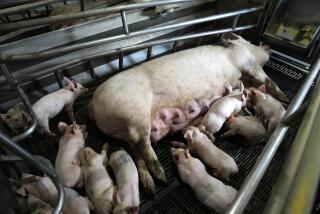Meat industry to enhance country-of-origin labeling
- Share via
The meat industry is a global business, but many consumers don’t realize how far their hamburger may have traveled to end up on their plates.
New federal labeling rules set to take effect Saturday will illuminate that process by requiring meatpackers to list where livestock was born, raised and slaughtered. That’s a step up from the current law, which only requires labeling country-of-origin.
The new rules update a law known as country-of-origin labeling (COOL) and are being applauded by consumer advocates and some U.S. beef ranchers who see the regulations as a victory for food safety and domestic sales.
Major meatpackers such as Cargill Inc. and Tyson Foods Inc. oppose the law as wasteful and costly. They argue that the U.S. already has rules in place to enforce food safety and fear the law will unfairly shrink demand for imported meat.
QUIZ: How well do you understand the Fed stimulus?
The USDA estimates that compliance will cost the meat industry between $53.1 million and $192.1 million.
Included in those costs will be the elimination of commingling — the farming of livestock from different countries, which created efficiencies for meatpackers. Livestock will now have to be separated according to origin, which will require new infrastructure for the meat industry.
“The costs associated with this new inefficient process will drive some processors dependent on imports out of business and destroy the market for meat from imported livestock,” the American Meat Institute said in a complaint against the USDA that argued the law compelled speech, a violation of 1st Amendment rights.
The suit filed in a U.S. District Court in Washington, D.C., aimed to block the rules from taking effect but was denied by a judge. The ruling has since been appealed.
Canada and Mexico say the law has already led to weaker livestock exports and have challenged the regulation through the World Trade Organization.
Tyson announced in October it had stopped buying slaughter-ready Canadian cattle because of the cost of adhering to the new version of COOL.
The law, which was approved by Congress in 2002, grew out of fears over imported mad-cow disease. But it wasn’t until 2008 that consumers saw any impact in the meat case. That’s when labeling showing country of origin was first required.
There remains a chance the updated version of COOL could be repealed depending on how lawmakers shape the new farm bill.
That would be a blow to consumers, say supporters of the enhanced labeling.
“Country-of-origin labeling provides consumers with vital information that allows them to make informed choices about the food they eat,” said Consumers Union in a letter to members of both houses of Congress.
The group said a poll they conducted found over 90% of respondents were in favor of country-of-origin labeling.
ALSO:
Brazil poised to become a top oil producer by 2035
Income inequality is linked to depression, study finds
Google to invest in solar farms in California and Arizona
Twitter: @dhpierson
More to Read
Inside the business of entertainment
The Wide Shot brings you news, analysis and insights on everything from streaming wars to production — and what it all means for the future.
You may occasionally receive promotional content from the Los Angeles Times.











